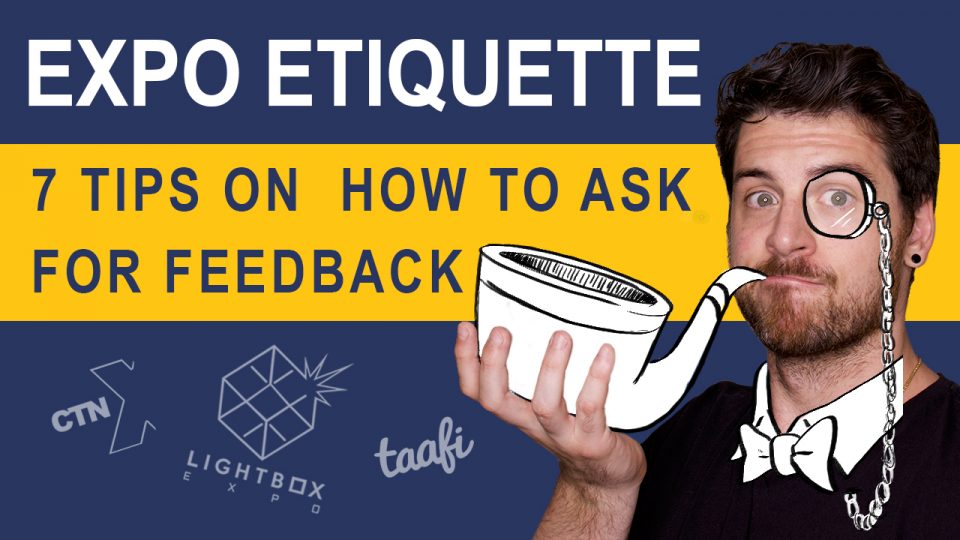HOW TO GET FEEDBACK AND NETWORK AT EXPO/CONVENTIONS

As professional storytellers, we might want to go to expos or conventions, trying to get some portfolio feedback. And as the first Lightbox Expo is coming up on September 6th, I thought this could be a good time to share some tips!
I was at the last TAAFI Job Fair in Toronto, reviewing portfolios as well as I’ve shown my work as an attendee at many expos and here is what I would call my “Expo Etiquette”!
Be on Topic
When I was looking at portfolios I was really surprised by how many of them were off-topic. If you aim to get a job in a certain field, your work should reflect that. If you go up to someone who works in a specific discipline because you want some feedback on how to get into that field, but your portfolio is packed with pages relevant to a completely different area; you won’t get the feedback you need. You should only show work that is relevant to the job you are looking for and if you are interested in more positions, maybe consider having separates portfolios
Be prepared
These events are jam-packed and busy. Artists and recruiters are looking at hundreds of people every day: Show them you are professional and value their time as well as yours.
This means having the computer or tablet out of the bag, turned on, and your files opened. Asking to review your work and only then turning on your computer, shows a lack of organization. Give them a good first impression by being ready to go.
If you want to know specific information or specific feedback, have your questions ready. And let the person in front of you know what you are looking for (feedback, internship, job?). It’s good to let them know what are you looking for.
Relax
In my experience at these conventions, 99% of the artists and storytellers are very friendly, so try to relax and enjoy the experience.
Remember that whoever is checking portfolios, is probably doing so for a good chunk of their day, and meeting someone that can chat in a relaxed manner becomes even more enjoyable during these stressful, human-packed events. They are looking forward to interact with some interesting people, but they won’t be able to appreciate your personality if you are all tensed up. So relax.
Sometimes, at these events, a good attitude is more important than amazing work because it makes it easier to connect to people in the long run.
Show only your best work
As a general rule, there is no reason to show mediocre work. Show only your best and because these events are time-sensitive and they can move along pretty fast, show your best work first! Whoever is giving you feedback might never get to the last page or image.
And if you are a student and the portfolio is still a work in progress before applying to an internship, tell them that. Ask where you should go from there.
Be a professional
Introduce yourself as a professional would do even if are a student. When I was in college I would say something like: Hi, my name is Camillo. I’m a storyboard artist and I am studying at Sheridan College. I was a storyboard artist, even if in school. It wasn’t about faking it until you make it.
Also, it doesn’t matter if you think your work is not good enough: Don’t apologize. No professional artist would apologize while delivering work to a client or supervisor, so it’s a good lesson to learn right now. It just doesn’t reflect well on you.
Follow up
This is probably the most piece of advice I was given: always follow up with the people you met. You got a business card or contact information from a recruiter, an artist, or a peer.
Don’t write right away. Wait a few days or even a week, then send them an email. The reason you want to let some time pass is that in this way you will bring back your name and face, reinforcing them in their memory.
You don’t have to write something extraordinary. Just tell them you are glad you met them, it was fun, thanks for the chat, feedback, drink… Whatever it was. End with a “keep in touch”
Be Nice
It seems redundant to say this, but remember to thank the people that look at your work. Most people do, but there are always a few exceptions in my experience, so I decided to put it in my tips.
Time has real value, try to appreciate it when someone gives it to you. Side note: This is also true for emails. If you ask for some feedback, ask politely. And if you get an answer, remember to reply and thank the person.
Share you stories!
This is my Expo Etiquette, but what were your experiences at these events and what tips would you give to your fellow storytellers? Please leave a comment or question down below.
Check the video on YouTube at https://youtu.be/5nDYOI4_s0Y